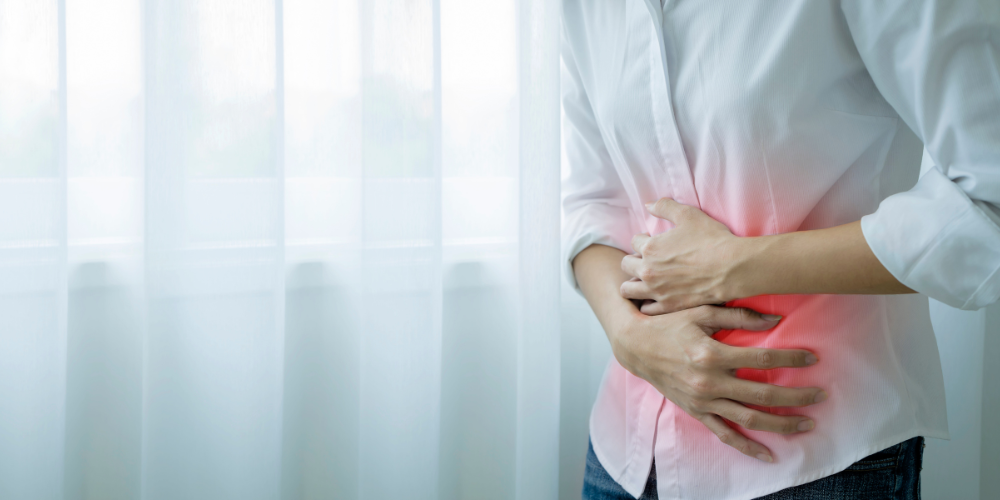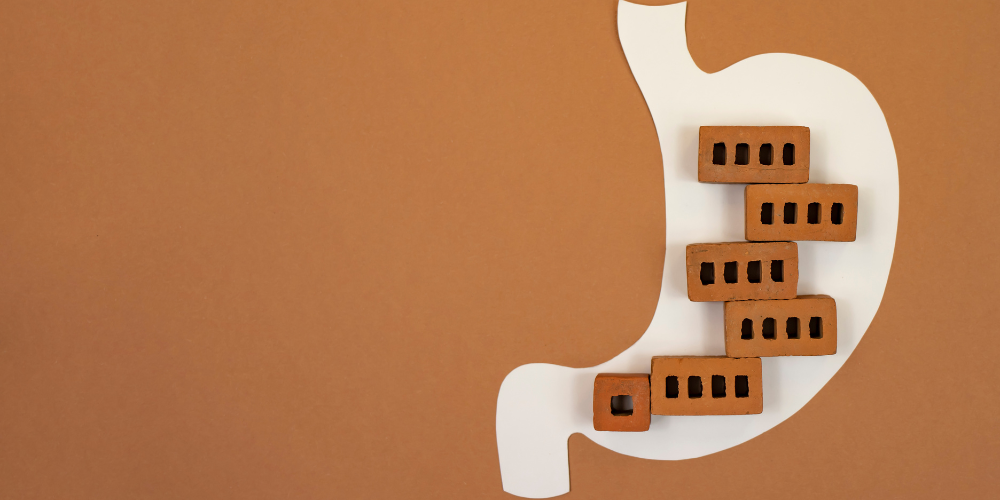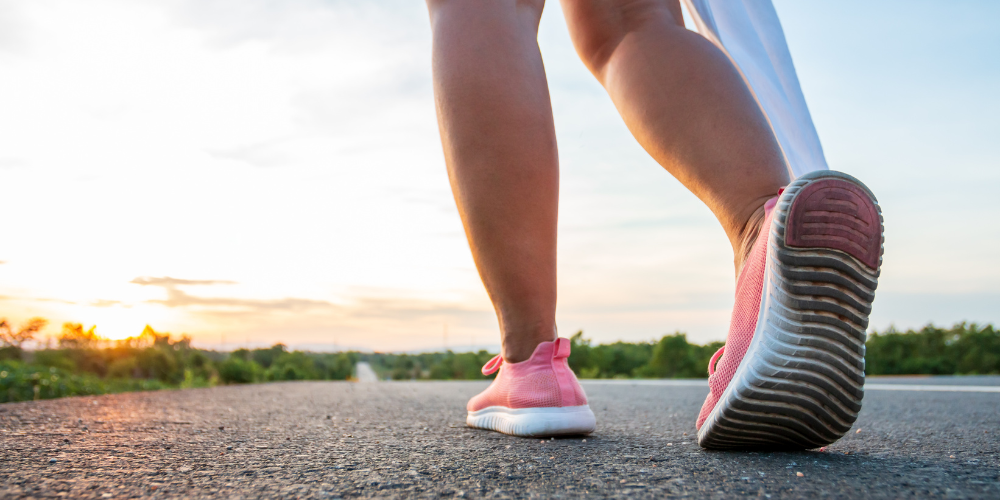
Belly Bloat? Try These 4 Tips
Who doesn’t love a big comfort meal? Chances are though, you don’t love the possible bloating that comes along with it. Unfortunately bloating is just a part of life and is fairly common.
There are small habits you can make that can help deter bloating, but there are also some long-term changes you can make to prevent that pesky bloat from reoccurring.
First things first, though…

What is Belly Bloat?
Ever feel super full and uncomfortable? That’s bloating.
Abdominal bloating happens when your gastrointestinal (GI) tract is filled with gas or air. Your stomach may feel tight, full, or swollen. It might even feel hard and sometimes painful. When you’re bloated, additional symptoms may occur such as:
- Frequent burping
- Excessive gas
- Abdominal rumbling or gurgling
While bloating is common, for some people it can interfere with activities and being social. Luckily, it is often a short-term problem that can be resolved on its own.[1,2,3,4,5]
What Causes Belly Bloat?
There are a handful of reasons you may experience belly bloat, other than just eating too much. Here are a few common causes:
Gas or Swallowing Too Much Air
Other than eating too much, gas trapped in the GI tract is the next most common reason for belly bloat (these sometimes go hand-in-hand).[5] Gas or swallowing too much air occurs if you:
- Smoke
- Chew gum
- Drinking or eating too much
- Drinking through a straw
- Carbonated beverages
Slow gas transport (or delaying emptying the stomach) plus gas buildup can cause more bloat and stretch of the abdomen.
Stress and Other Mental Health Factors
Do you feel uneasiness in your stomach when you’re feeling stressed or anxious?
Stress and anxiety are shown to cause unbalance in your digestive system. For some, stress can also slow down digestion, resulting in bloating. On the other hand, for some people it speeds up digestion, causing stomach upset.[6]
Digestive Issues or Medical Conditions
There are numerous medical conditions that can cause bloating, such as[7]:
- Inflammatory bowel disease
- Irritable bowel syndrome
- Food intolerance
- Heartburn
- Eating disorders
- Hormonal flux
And various others.
If you’re experiencing any of these, we recommend discussing possible ways to combat bloat and other issues with your doctor
4 Tips to Beat the Bloat
There are some short-term and long-term steps you can take to help reduce belly bloat. If you’re determined to prevent or reduce belly bloat, try some of these out:

Lifestyle Changes
A few lifestyle changes can make all the difference. They can either prevent bloat from happening or diminish it if you’re currently experiencing it. Here are a few notes:
Avoid Gum
Try breath mints instead. Chewing gum not only contains sugar alcohols that can cause bloating but also allows you to swallow air while chewing which leads to bloating and gas pains.[8]
Avoid or Limit Certain Foods
Certain foods, like vegetables in the cabbage family, lentils, and dried beans, can cause gas. Other foods to avoid include[9,10,11]:
- Fried, spicy, or fatty foods
- Apple or prune juice
- Dried fruits
- Foods containing mannitol, sorbitol, or maltitol (usually found in sugar-free and low-carb foods)
Keep a food diary to help gauge what is the trigger for bloating.
Limit Carbonated Drinks
Gas can build up after drinking fizzy drinks. Also, they contain artificial sweeteners and added sugars that can cause bloating.[8]
Eat Smaller Portions at Regular Intervals
Instead of indulging in larger meals, try breaking it up throughout the day with smaller meals. This can help keep your digestive system moving.[12]
Limit the Salt
The body retains water when there’s excess sodium in the diet. This results in a bloated, swollen feeling in the body, as well as other areas like your feet and hands.[12]

Exercise Regularly
If you get your body moving, your body is more likely to move that gas out of your system and help you become more regular. It also helps rid the body of sodium and relieve water retention.[5,13,14]
Try out walking or yoga to get started. These two physical activities can help:
- Get the bowels moving more regularly
- Release excess gas
- Position the muscles in the abdomen to encourage the release of excess gas
Yoga is also beneficial if you’re dealing with stress—a possible cause of bloating.
Drink Plenty of Water
As we said before, fizzy drinks can be an issue if you’re experiencing bloating. Instead, opt for water.
We should be drinking tons of water as it is, especially if exercise is part of a daily routine. Dehydration can lead to constipation or make constipation symptoms worse. Don’t worry about drinking too much water causing bloat—your body gets rid of the excess water it doesn’t need once you are hydrated.[15]
Massage Your Stomach
Want to get your bowels moving? Try an abdominal massage. The idea is to massage in a way that follows your large intestine.[16] To do an abdominal massage, follow these steps:
- Place your hands above your right hip bone.
- In a circular motion, rub with light pressure toward the right side of your ribcage.
- Going straight across, rub the upper belly toward your left ribcage.
- Move slowly towards your left hip bone.
- Repeat as necessary.
Resources:
- Mari, A., Abu Backer, F., Mahamid, M., Amara, H., Carter, D., Boltin, D., & Dickman, R. (2019). Bloating and Abdominal Distension: Clinical Approach and Management. Advances in therapy, 36(5), 1075–1084. https://doi.org/10.1007/s12325-019-00924-7
- Lacy, B. E., Cangemi, D., & Vazquez-Roque, M. (2021). Management of Chronic Abdominal Distension and Bloating. Clinical gastroenterology and hepatology : the official clinical practice journal of the American Gastroenterological Association, 19(2), 219–231.e1. https://doi.org/10.1016/j.cgh.2020.03.056
- Mearin, F., Lacy, B. E., Chang, L., Chey, W. D., Lembo, A. J., Simren, M., & Spiller, R. (2016). Bowel Disorders. Gastroenterology, S0016-5085(16)00222-5. Advance online publication. https://doi.org/10.1053/j.gastro.2016.02.031
- Kamboj, A. K., & Oxentenko, A. S. (2018). Workup and Management of Bloating. Clinical gastroenterology and hepatology : the official clinical practice journal of the American Gastroenterological Association, 16(7), 1030–1033. https://doi.org/10.1016/j.cgh.2017.12.046
- Malagelada, J. R., Accarino, A., & Azpiroz, F. (2017). Bloating and Abdominal Distension: Old Misconceptions and Current Knowledge. The American journal of gastroenterology, 112(8), 1221–1231. https://doi.org/10.1038/ajg.2017.129
- Cohen, M. (2022, October 27). Yes, stress can cause bloating. here's what to do. The IBS & Gut Health Clinic. Retrieved November 18, 2022, from https://ibsguthealthclinic.co.uk/stress-can-cause-bloating/
- Seo, A. Y., Kim, N., & Oh, D. H. (2013). Abdominal bloating: pathophysiology and treatment. Journal of neurogastroenterology and motility, 19(4), 433–453. https://doi.org/10.5056/jnm.2013.19.4.433
- Mayo Foundation for Medical Education and Research. (2022, January 6). Practical tips to reduce bloating, belching and Gas. Mayo Clinic. Retrieved November 18, 2022, from https://www.mayoclinic.org/diseases-conditions/gas-and-gas-pains/in-depth/gas-and-gas-pains/art-20044739
- Barrett J. S. (2017). How to institute the low-FODMAP diet. Journal of gastroenterology and hepatology, 32 Suppl 1, 8–10. https://doi.org/10.1111/jgh.13686
- Wilkinson, J. M., Cozine, E. W., & Loftus, C. G. (2019). Gas, Bloating, and Belching: Approach to Evaluation and Management. American family physician, 99(5), 301–309.
- Varney, J., Barrett, J., Scarlata, K., Catsos, P., Gibson, P. R., and Muir, J. G. (2017) FODMAPs: food composition, defining cutoff values and international application. Journal of Gastroenterology and Hepatology, 32: 53– 61. doi: 10.1111/jgh.13698.
- MediLexicon International. (n.d.). 18 ways to reduce bloating: Quick tips and long-term relief. Medical News Today. Retrieved November 18, 2022, from https://www.medicalnewstoday.com/articles/322525
- Hosseini-Asl, M. K., Taherifard, E., & Mousavi, M. R. (2021). The effect of a short-term physical activity after meals on gastrointestinal symptoms in individuals with functional abdominal bloating: a randomized clinical trial. Gastroenterology and hepatology from bed to bench, 14(1), 59–66.
- Johannesson, E., Ringström, G., Abrahamsson, H., & Sadik, R. (2015). Intervention to increase physical activity in irritable bowel syndrome shows long-term positive effects. World journal of gastroenterology, 21(2), 600–608. https://doi.org/10.3748/wjg.v21.i2.600
- National Academy of Sciences. (2004, February 11). Report Sets Dietary Intake Levels for Water, Salt, and Potassium To Maintain Health and Reduce Chronic Disease Risk. Nationalacademies.org. Retrieved November 8, 2022, from https://www.nationalacademies.org/news/2004/02/report-sets-dietary-intake-levels-for-water-salt-and-potassium-to-maintain-health-and-reduce-chronic-disease-risk
- Wang TJ, et al. (2015). The effect of abdominal massage in reducing malignant ascites symptoms. ncbi.nlm.nih.gov/pubmed/2555803
- Niu, H. L., & Xiao, J. Y. (2020). The efficacy and safety of probiotics in patients with irritable bowel syndrome: Evidence based on 35 randomized controlled trials. International journal of surgery (London, England), 75, 116–127. https://doi.org/10.1016/j.ijsu.2020.01.142
